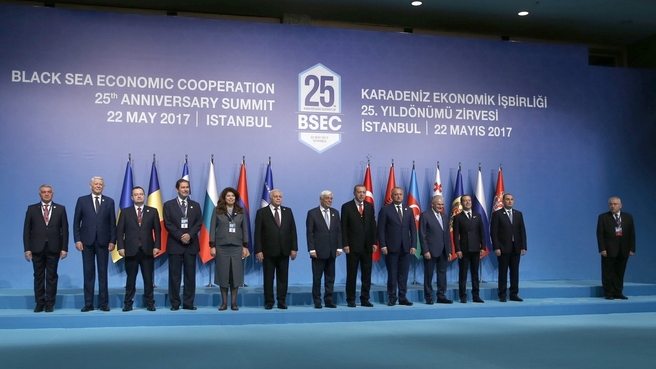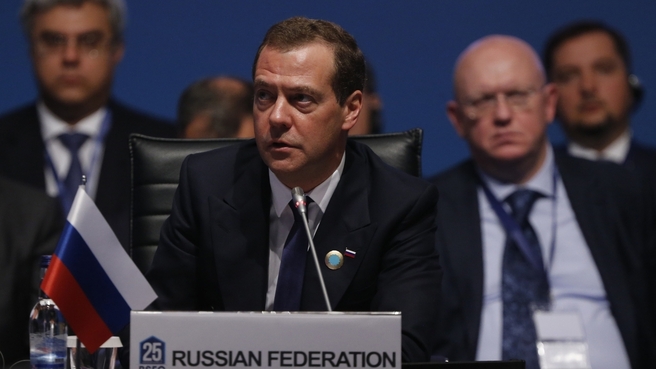Dmitry Medvedev speaks at the meeting.
List of heads of delegations taking part in the meeting of heads of state and government of the Organisation of the Black Sea Economic Cooperation member states:
Group photo of heads of delegations from the Organisation of the Black Sea Economic Cooperation member states.
Speaker of the Milli Mejlis of the Azerbaijan Republic Oktay Asadov
Deputy Foreign Minister of the Republic of Albania Halil Hyseni
Deputy Foreign Minister of the Republic of Armenia Ashot Hovakimian
Vice President of the Republic of Bulgaria Iliana Yotova
President of the Hellenic Republic Prokopis Pavlopoulos
First Deputy Prime Minister, Finance Minister of Georgia Dimitry Kumsishvili
President of the Republic of Moldova Igor Dodon
Prime Minister of the Russian Federation Dmitry Medvedev
Foreign Minister of Romania Teodor-Viorel Meleşcanu
First Deputy Prime Minister, Foreign Minister of the Republic of Serbia Ivica Dacic
President of the Republic of Turkey Recep Tayyip Erdogan
First Deputy Prime Minister, Minister of Economic Development and Trade of Ukraine Stepan Kubiv
Secretary General of the Organisation of the Black Sea Economic Cooperation Michael Christides
Dmitry Medvedev’s remarks
Excerpts from the transcript:
The decision to create the Organisation of the Black Sea Economic Cooperation (BSEC) was a far-reaching one. A pragmatic forum of countries that differ politically, economically and historically, BSEC has nevertheless managed to create an atmosphere of trust. It has proved its expedience as an effective mechanism that offers broad cooperation opportunities in 18 areas.
Bilateral trade between Russia and many BSEC countries grew substantially last year, yet the overall trade volume between BSEC countries continued to decrease largely due to insufficient investment and imbalances in trade structures.
Russia is a party to agreements on trade facilitation and sectoral cooperation. Russia is working in several formats. We are developing the Eurasian Economic Union (EAEU) and creating a barrier-free environment for the movement of goods. The EAEU is open to interaction. Last year, we created a special free trade zone with Vietnam and several other countries. We should work towards creating a common space for all integration associations, including Eurasian partnership, the Shanghai Cooperation Organisation and several other organisations.
Our organisation could become more closely integrated into the regional system of cooperation. We should develop strong ties with other international and regional organisations, banks and foundations in order to use them to create a broad comprehensive partnership.
Like other countries here, we are implementing many large bilateral projects with our BSEC partners in aircraft manufacturing, machine building, the chemical industry and metallurgy.
There are not enough multilateral projects. A mechanism for project-oriented cooperation has been created at Russia’s initiative. This approach can be also used in vital areas such as energy efficiency, green technology, SME development and export support.
We must boost the development of modern technology such as the IT infrastructure and bolster transport connectivity, including navigation on the Black Sea by creating new routes, promoting ferry and multimodal transport, modernising port infrastructure and building a ring road around the Black Sea. It would be wise to do this in relation to other international programmes in the region, including in integration formats; all the more so since several such formats can be used to achieve the BSEC goals that were formulated during the organisation’s establishment.
The Black Sea is our common wealth and heritage. All of us want to make it a region of stability and prosperity and draw practical economic benefits from our proximity to the sea. I am convinced that we can do this.











